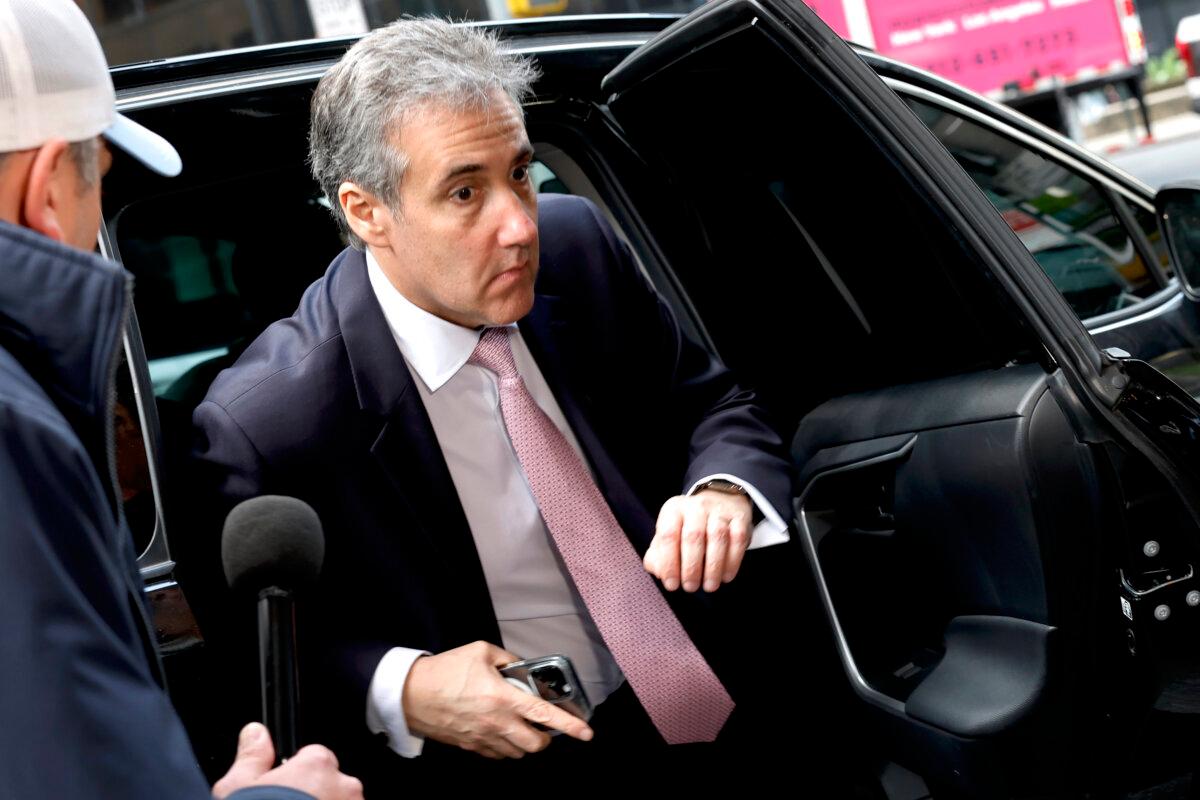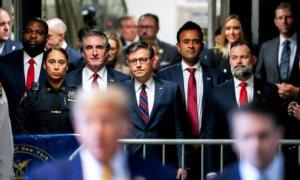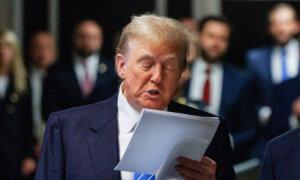‘I paid a lawyer a certain amount of money we marked it down as legal expenses,’ the former president said.
Former President Donald Trump appeared to respond to claims made by his former lawyer, Michael Cohen, during an appearance outside Manhattan criminal court in New York on Tuesday morning.
Mr. Cohen testified as a witness in the so-called “hush-money” case in which prosecutors have accused the former president of falsifying business records at the end of the 2016 election. The former president has pleaded not guilty.
In his remarks on Tuesday, President Trump did not mention Mr. Cohen but only said that he paid a lawyer an amount of money that was marked down as legal expenses. “There is no crime,” he said.
“I had a legal expense and I marked it down as a legal expense. I didn’t mark it down as a construction of wall, construction of a building, I didn’t mark it down as electricity,” President Trump said outside the courtroom.
The former president noted that due to a gag order that was imposed by New York State Supreme Court Justice Juan Merchan, he could not go into more details. So far, attempts by his lawyers to have the judge remove the gag order have been unsuccessful.
“You ask me questions, I’m not allowed to respond,” President Trump told reporters. “The gag order has to come off.”
He then criticized the judge as being “conflicted” and said that he has been there for a month “in an icebox,” referring to complaints that have been voiced about the temperature inside the courthouse.
Cohen’s Claims About Payment
Mr. Cohen, who served more than a year in a federal prison, told the court on Monday that in October 2016, he took out a line of credit to pay $130,000 to Stormy Daniels, an adult film performer, as part of a legal agreement to keep her silent about an alleged affair with President Trump, which he has categorically denied.
He later said that he believed the payment was made to prevent damage to the Trump campaign at the time.
“I ultimately said, ‘OK, I’ll pay it,’” Mr. Cohen claimed to the court, saying that former Trump Organization official Allen Weisselberg told him that he would be reimbursed for the payment. “I was doing everything that I could and more to protect my boss,” Mr. Cohen said, adding that he would not have made the payment without the former president’s alleged approval.
President Trump has denied Mr. Cohen’s claims, and his lawyers have accused the former attorney of trying to profit from his claims against President Trump. They’ve also said that he holds a personal animus against his former boss.
Mr. Cohen, the prosecution’s most important witness, alleged that President Trump was directly connected to the payments. His testimony helped illuminate some of the drier evidence, such as text messages and phone logs that jurors had already seen.
President Trump’s lawyers will get their chance to begin questioning Mr. Cohen as early as Tuesday, when they’re expected to attack his credibility—he was disbarred, went to prison, and separately pleaded guilty to lying about a Moscow real estate project on President Trump’s behalf—and cast him as a vindictive, agenda-driven witness.
Cohen Warned About Public Comments
The defense told jurors during opening statements that Mr. Cohen is an “admitted liar” with an “obsession to get President Trump.”
Last week, Justice Merchan told prosecutors that they need to inform Mr. Cohen that he should not make any further public remarks about the trial after Trump attorneys noted that Mr. Cohen was seen in a recent social media video interview wearing a shirt that depicted President Trump in prison.

To lay the foundation that the deals were done with President Trump’s endorsement, prosecutors obtained testimony from Mr. Cohen designed to show he was a hands-on manager. Mr. Cohen said that he sometimes lied and bullied others, including reporters.
“When he would task you with something, he would then say, ‘Keep me informed. Let me know what’s going on,’” he testified. He said that was especially true “if there was a matter that was troubling to him.”
In previous remarks on social media, President Trump responded to other witness claims made during the trial by saying that he cannot respond specifically to “lies and false statements” made about him. His lawyers have argued that the judge’s gag order is unconstitutional and restricts the former president’s First Amendment rights, namely during his presidential campaign.
The trial is expected to last about two more weeks.
The Associated Press contributed to this report.
Original News Source Link – Epoch Times
Running For Office? Conservative Campaign Consulting – Election Day Strategies!


